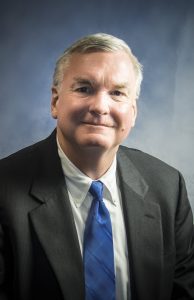Board Spotlight – Coalter Baker, CPA
 Coalter Baker was born and raised in Austin, TX, and graduated with a degree in accounting from the University of Texas. Since then, Baker has had a very full career and says he has no regrets about the career path he has taken. “It is so much more than numbers. This is a learned profession that allows us to help people solve problems in their financial lives,” he said.
Coalter Baker was born and raised in Austin, TX, and graduated with a degree in accounting from the University of Texas. Since then, Baker has had a very full career and says he has no regrets about the career path he has taken. “It is so much more than numbers. This is a learned profession that allows us to help people solve problems in their financial lives,” he said.
Baker has been married to his wife, Missy, also a CPA, for 38 years. They have two children, Boone and Jackson. Boone is a captain in the U.S. Marine Corps and Jackson is a student at Southern New Hampshire University and works with Baker part time.
To become better acquainted with Baker and his journey to becoming the leader that he is today, he was interviewed for the CPT’s Board Spotlight series. The full interview can be found below.
1. Tell us a little bit about your background.
I initially worked for an out-of-state comptroller, until the opportunity to work in public accounting was presented to me. My client relationships are personal, not institutional.
I was then very honored when the Governor of Texas asked me to join the Texas Board of Accountancy in 2003. I approached my service on the Board very seriously and had the chance to serve and chair several committees and task forces, as well as serve as presiding officer, over the 11 years I served. During this time, the chair of the University of Texas Accounting Department allowed me to teach a course in taxation. This was probably the most rewarding, yet difficult, role I have ever undertaken.
Once I became involved with NASBA, I experienced opportunities that I never thought possible. Since attending my very first regional meeting, I have served on the NASBA Ethics, Nominations and Strategic Planning Committees as well as a NASBA representative to the AICPA Professional Ethics Executive Committee. I am now in my fifth year serving as an elected NASBA Board of Directors member and continue to be honored to serve the profession that has given me so much.
2. Tell us about your work on the Texas State Board of Accountancy.
I was provided ample opportunity to participate and lead various committees and task forces of the Board. I chaired the Ethics Task Force, which developed program requirements that are still used today for licensees. I also served on multiple enforcement committees during my tenure on the Board.
3. How did you first become involved with the CPT? Was there anything that surprised you about the organization?
The CPT is very visible at all NASBA functions. Its goals and objectives advance the ethical ideals that our profession should hold and begin training the next generation at a time when they are besieged with personal conflicts almost daily. I have been fortunate to get to know Alfonzo Alexander and his family over the last few years, and the CPT is an extension of his heart. The love he has shown for each student in the program is to be admired.
4. What has been your greatest motivator over the years?
I am a happy person and believe that 99 percent of people have good hearts, no matter where they come from or their economic state. Helping people solve problems in areas they do not understand is the most rewarding experience a professional can have.
5. Can you share a valuable leadership or life lesson you learned after having made a mistake?
I was not the greatest student in college and thus was unable to obtain the type of job in the accounting profession I desired. When rejection came, and there were quite a few of them, I had a choice to either quit and find something else or “get back on the saddle” and push forward. I have spent my career overcoming this early setback by learning to be the best I can be.
6. What is one characteristic you believe every leader should possess?
“Listen, Learn and Lead.” And always do it with a smile!
7. Which book would you recommend every leader read?
River of Doubt follows the trials, tribulations and near-death experience of President Teddy Roosevelt in his quest to explore the rivers and jungles of South America. It is one of the few books that made me feel like I was involved in the mission.
8. What is the key to developing the next generation of leaders?
The CPT is a perfect example of how to train the next generation of leaders. The earlier young people can be taught how to handle conflict and dilemma in their lives, the better. Young adults will then be able to deal with more difficult issues later in life. The young people of today also need to learn the skill of not rushing to judgement until they gather all the facts.
9. Why should every leader enroll in the CPT’s programming?
When CPT students speak at NASBA functions, they appear to have a high level of self-esteem and are focused on who they are and how they can be a part of solutions. People of any age could benefit from a connection with people of similar mind, who have goals to lead us into the future.
-Dina Barabash, NASBA Content Development & Web Specialist
